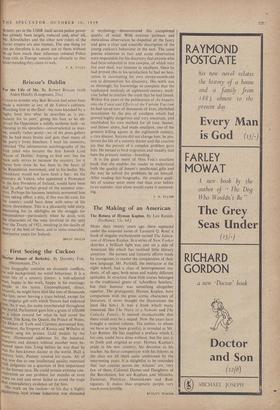First Seeing the Cuckoo
boctor Jenner of Berkeley. By Dorothy Fisk. (Heinemann, 25s.)
Flits biogyaphy contains no dramatic conflicts, no odd background, no weird behaviour. It is a. quiet life of a country doctor; a well-adjusted 'Ilan, happy in his work, happy in his marriage; snliPle in his tastes. Uncomplicated, direct, leisurely, he might have died like tens of thousands like him, never leaving a trace behind, except for noe singular gift with which Nature had endowed him. As it was, his name reverberated throughout the world. Parliament gave him a grant of £10,000 4` a token reward for what he had saved the nation. The King, the Queen, the Prince of Wales, Le Dukes of York and Clarence patronised him. napoleon, the Empress of Russia and Wilhelm of
russia sang his praises. Gold medals by the
bouquets illuminated addresses by the hundred, "ouquets and dinners without number were be- stowed upon him. Long before he was dead he was the best-known doctor in the world. Half a century later, Pasteur revered his name. All of this was due to one intellectual quality exercised with judgment on a question of first importance to the human race. He could sustain extreme con- centration on one problem for months or even Years on end and never failed to avoid the traps that contradictory evidence set for him. His work on the cuckoo—in his day a highly mysterious bird whose behaviour was shrouded in mythology—demonstrated this exceptional quality of mind. With extreme patience and meticulous observation he dispelled all the fancy and gave a clear and scientific description of the young cuckoo's behaviour in the nest. The same precise attention to fact and acute observation were responsible for his discovery that anyone who had been subjected to true cowpox, of which very few ever died, was immune to smallpox. Once he had proved this to his satisfaction he had no hesi- tation in vaccinating his own eleven-month-old son to demonstrate his discovery. His work was so thorough, his knowledge so complete that the haphazard methods of eighteenth-century medi- cine, failed to confuse the truth that he had found. Within five years of the publication of An Inquiry into the Cause and Effects of the Variolw Vaccine he had saved tens of thousands of lives, abolished inoculation by the pus of smallpox which had proved highly dangerous and very uncertain, and established his own method for all time. Jenner, and Jenner alone, had made smallpox, one of the greatest killing agents in the eighteenth century, u rare disease. Success did not change him; he pre- ferred the life of a country doctor and the creative joy that the pursuit of a complex problem gave him. He turned to bird migration and steadily laid bare the primary motive—breeding. It is the great merit of Miss Fisk's excellent book that she enables the reader to understand both the quality of Jenner's intellectual gifts and the way he solved the problems he set himself. After reading this biography, the creative quali- ties of science seem more real than ever before to an outsider; that alone would make it outstand- i ng.
J. H. PLUMB






































 Previous page
Previous page